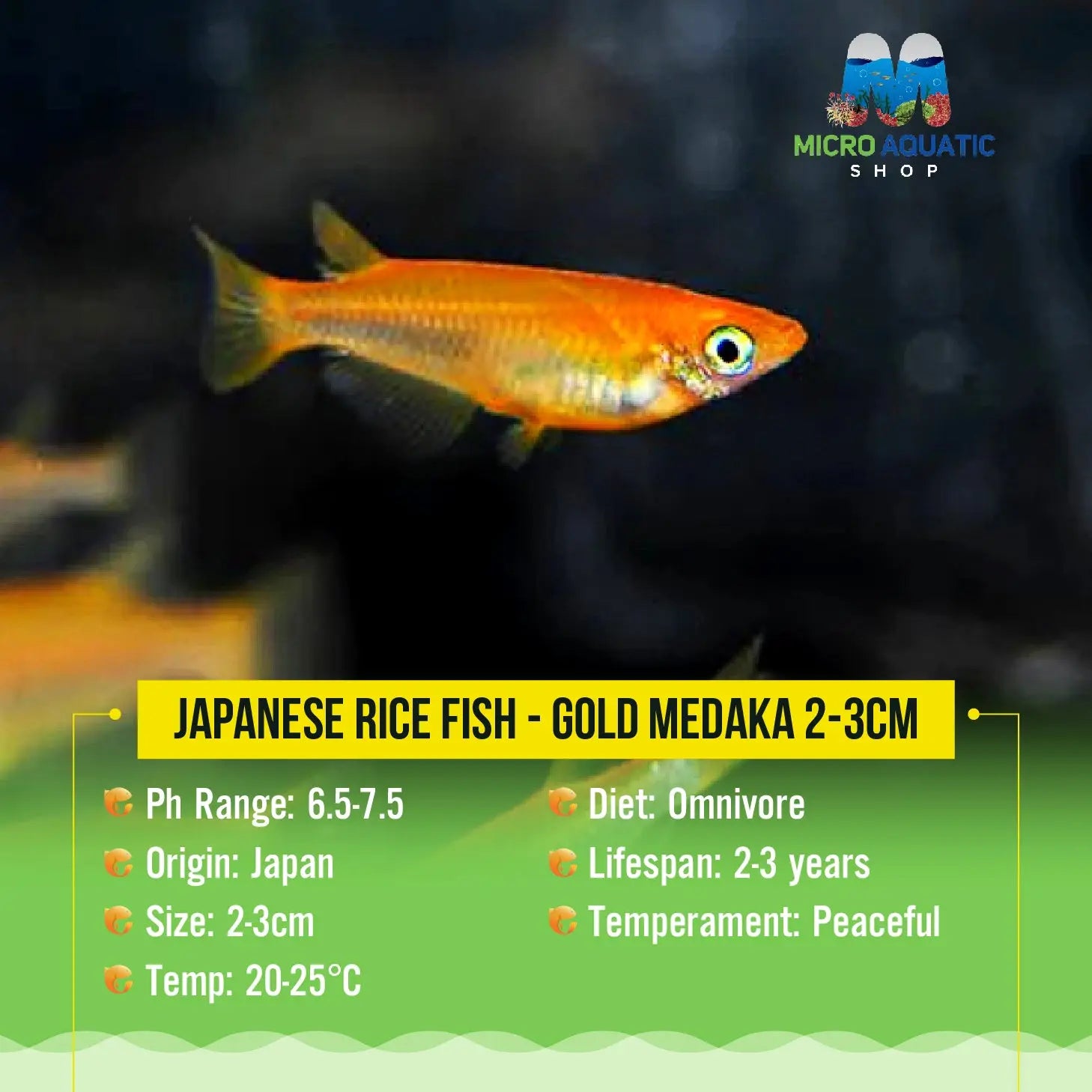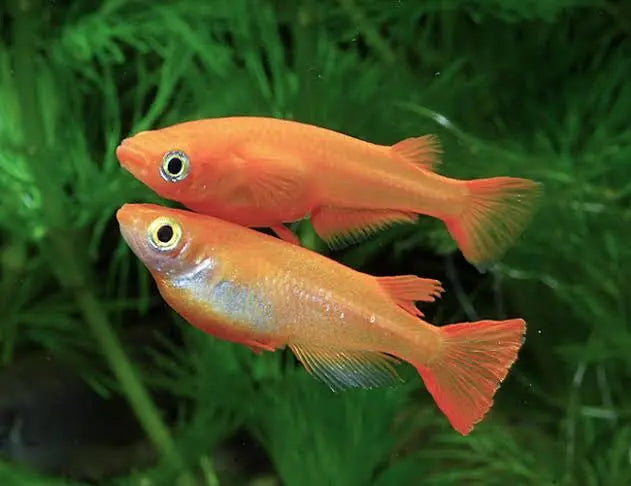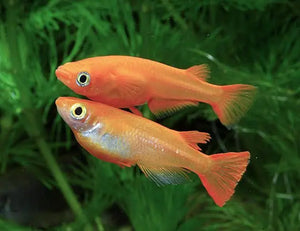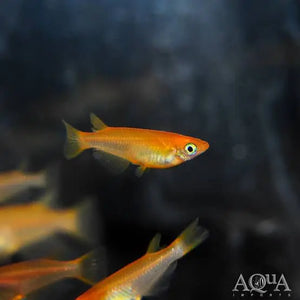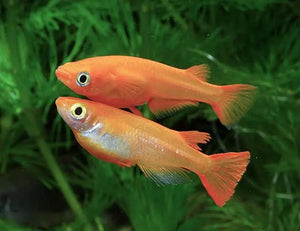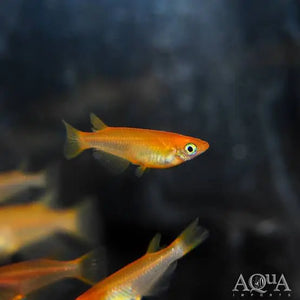Japanese rice fish - Gold Medaka 2cm
Order today - receive it in as little as 3-5 days.
Return within 30 days of purchase. Duties & taxes are non-refundable.
Guarantee Safe Checkout
Japanese Rice Fish (Gold Medaka) - Hardy; Colorful Freshwater Fish for Aquariums
We love finding new freshwater fish for our aquariums in Australia. The Japanese Rice Fish, or Gold Medaka, is one we can't get enough of. They're hardy, colourful, and loved by many.  The Gold Medaka comes from Japan's rice paddies. Their golden scales and smooth movements make them a stunning addition to any tank. They're easy to care for, perfect for anyone wanting a thriving aquarium. In this guide, we'll explore the Gold Medaka's history, looks, and care needs. Whether you're new to fish keeping or experienced, this article will help you welcome these beautiful fish into your home.
The Gold Medaka comes from Japan's rice paddies. Their golden scales and smooth movements make them a stunning addition to any tank. They're easy to care for, perfect for anyone wanting a thriving aquarium. In this guide, we'll explore the Gold Medaka's history, looks, and care needs. Whether you're new to fish keeping or experienced, this article will help you welcome these beautiful fish into your home.
Key Takeaways
- The Japanese Rice Fish, or Gold Medaka, is a hardy and colourful freshwater fish that makes an excellent addition to home aquariums.
- These fish are known for their resilience and adaptability, making them a great choice for both novice and experienced aquarists.
- With their shimmering golden scales and graceful movements, Gold Medaka add a touch of natural beauty to any aquarium setup.
- This comprehensive guide will explore the history, physical characteristics, and care requirements of the Japanese Rice Fish, providing you with the knowledge to successfully incorporate them into your aquatic oasis.
- Keeping Japanese Rice Fish, or Gold Medaka, can be a rewarding and enjoyable experience for aquarium enthusiasts in Australia.
Introduction to Japanese Rice Fish (Gold Medaka): A Brief History
Let's explore the origins and growth of the medaka rice fish, also known as the Japanese killifish or ricefish. These colourful fish have a rich history tied to Asian aquaculture. Their story is both captivating and deeply rooted in culture.
Origins in Japanese Rice Paddies
The medaka rice fish started in Japan's rice paddies. They lived in the rich waters, their bright colours and lively nature charming farmers. Over time, they became a cherished part of rural life, showing the balance of nature.
Cultural Significance in Asian Aquaculture
In Asian aquaculture, medaka rice fish hold a special place. They were more than pets; they symbolised luck, prosperity, and identity. Breeding them was a favourite hobby, with certain colours and patterns highly valued.
Evolution to Modern Aquarium Keeping
As the world connected, medaka rice fish moved from rice paddies to aquariums worldwide. Their ability to adapt, their colours, and hardiness made them a hit. Now, they enchant aquarium fans, showing their journey from Japan to global aquariums.
Physical Characteristics and Varieties of Gold Medaka
The gold medaka, also known as the Japanese Rice Fish, are small freshwater fish. They have bright colours and special features. These traits make them popular in aquariums across Australia.  The gold medaka come in many colours thanks to selective breeding. You can find them in golden-yellow, red, white, and black. This variety makes them a rainbow of choices for aquarium owners.
The gold medaka come in many colours thanks to selective breeding. You can find them in golden-yellow, red, white, and black. This variety makes them a rainbow of choices for aquarium owners.
- Classic golden-yellow gold medaka
- Vibrant red gold medaka morphs
- Elegant white gold medaka variants
- Dramatic black gold medaka strains
The gold medaka have unique features beyond their colours. Their bodies are shaped like torpedoes, allowing them to swim fast. Their big eyes and soft fins make them even more charming.
| Characteristic | Description |
| Size | Generally reach up to 4-5 cm (1.5-2 inches) in length |
| Body Shape | Compact, streamlined, and torpedo-like |
| Fins | Delicate, lace-like fins that add to their graceful movement |
| Eyes | Large, expressive eyes that contribute to their endearing appearance |
The gold medaka or Japanese Rice Fish are loved for their colours, unique traits, and charm. It's easy to see why they're a favourite among aquarium fans in Australia and worldwide.
Japanese Rice Fish, Gold Medaka: Habitat Requirements and Tank Setup
To keep the Japanese Rice Fish, or Gold Medaka, in our aquariums, we must mimic their natural habitat. These stunning fish come from Japan's rice paddies, where they've lived for centuries. Let's look at what they need to thrive in our tanks.
Water Parameters and Quality
The Gold Medaka is a hardy fish that can adapt to various water conditions. They do best in:
- Temperature: 18-25°C
- pH: 6.5-8.0
- Hardness: 5-15 dGH
Keeping the water quality consistent is key. We'll need to do regular water changes and use a good filter to keep the tank clean.
Tank Size and Layout
These active fish need a tank of at least 20 litres. But a 40-50 litre tank is better for a more natural environment. The tank should have gentle water flow and a mix of open swimming areas and dense plants.
Plants and Decorations
To set up the perfect tank, we'll add live plants like Water Wisteria, Water Sprite, and Java Moss. These plants provide hiding spots and help oxygenate the water. Decorations like driftwood, rocks, and sand can also be added to make the tank look natural and enrich the environment.
| Ideal Water Parameters | Recommended Tank Size | Suitable Aquarium Plants |
|
|
|
By creating the right habitat and a visually appealing environment, we can ensure our Gold Medaka thrive in our aquariums.
Feeding and Nutrition Guidelines
To keep our medaka rice fish healthy and colourful, we need to feed them right. As fans of these fish, we must follow certain guidelines. This ensures they do well in our aquariums. Medaka rice fish eat both plants and proteins. A good start is high-quality flakes or pellets made for small fish. Adding live foods like brine shrimp or daphnia can make their colours pop. We should feed them often but not too much. Give them just enough for a few minutes, two to three times a day. Too much food can harm the water and their health, so it's important to get it right.
| Food Type | Recommended Portion | Feeding Frequency |
| High-quality flakes or pellets | Enough for fish to consume in 2-3 minutes | 2-3 times per day |
| Live foods (brine shrimp, daphnia) | Moderate amounts, as a treat | 1-2 times per week |
By following these guidelines, we can keep our medaka rice fish healthy and colourful. This lets us enjoy their beauty and charm in our homes.
Breeding and Reproduction Cycles
Breeding the Japanese Rice Fish, or Oryzias Latipes, is rewarding for aquarium fans. Knowing how to breed them is key to adding new fish to your tank. It involves understanding the right conditions and caring for the eggs and fry.
Spawning Conditions
The Oryzias Latipes breed a lot. To encourage them, keep your tank dimly lit and full of live plants. This provides safety and hiding spots. A temperature of 22-26°C and pH of 6.5-7.5 is perfect for them.
Egg Care and Hatching
After the female lays her eggs, watch them closely. The parents might eat any eggs that are disturbed. With good water and temperature, the eggs hatch in 7-10 days.
Raising Fry Successfully
- Provide a well-planted aquarium with gentle water flow and ample hiding spots for the fry.
- Feed the newly hatched fry a diet of liquid fry food, powdered fish flakes, or infusoria, ensuring they receive the necessary nutrients for healthy growth.
- Perform regular partial water changes to maintain water quality and prevent the buildup of harmful waste products.
- Be patient and attentive, as raising medaka fry can be a delicate process, but the rewards of seeing them thrive are truly worth the effort.
Understanding the breeding habits of Oryzias Latipes helps Australian aquarists add these colourful fish to their tanks. It enriches the world of medaka breeding and aquaculture.
Health Management and Common Issues
We love our aquariums and the fish in them, especially the Japanese Rice Fish, or gold medaka. These fish are hardy but can face health problems. Knowing how to prevent and treat these issues helps them stay healthy.  Ich, a parasitic infection, is a common problem. It causes white spots on the fish's body. To fight it, we check the water quality often and change it partially. Using a good water conditioner also helps keep the fish safe.
Ich, a parasitic infection, is a common problem. It causes white spots on the fish's body. To fight it, we check the water quality often and change it partially. Using a good water conditioner also helps keep the fish safe.
- Symptoms of Ich include white spots, lethargy, and loss of appetite.
- Treating the infection with a suitable medication, such as copper-based treatments, can be effective in eliminating the parasite.
- Ensuring the aquarium is well-cycled and maintaining stable water parameters are crucial in preventing ich outbreaks.
Fin rot is another issue for gold medaka. It makes the fins look bad and discoloured. To fix this, we improve the water quality and reduce how crowded the tank is. Sometimes, we need to use antibacterial medicine.
| Common Health Issues | Symptoms | Treatment |
| Ich (Parasitic Infection) | White spots, lethargy, loss of appetite | Copper-based treatments, water changes |
| Fin Rot (Bacterial Infection) | Ragged, discolored fins | Improve water quality, use antibacterial medication |
By keeping a close eye on our aquariums and treating health problems quickly, we can help our gold medaka live well. With proper care, these beautiful fish will keep us entertained with their vibrant colours and lively personalities.
Conclusion
The Japanese Rice Fish, or Gold Medaka, is a standout freshwater fish. It's perfect for aquarium lovers. These colourful fish have a long history in Asian aquaculture and are now popular in ornamental fish keeping. Gold Medaka are known for their bright colours and easy-going nature. They fit well in many aquariums. Whether you're new to aquariums or have been keeping them for years, these fish are worth considering. They need the right home to thrive. With proper care, they can bring joy for hours. If you want to add these unique fish to your collection, check out our shop, Micro Aquatic Shop in Wetherill Park, NSW. We have a wide range of high-quality ornamental fish, including the Japanese Rice Fish. Let us help you set up the best home for your Gold Medaka friends.
FAQ
What are Japanese Rice Fish (Gold Medaka)?
Japanese Rice Fish, also known as Gold Medaka, are colourful freshwater fish from Japan's rice paddies. They're loved by both new and seasoned aquarium fans for their bright colours and simple care.
Where do Japanese Rice Fish come from?
These fish come from Japan's rice paddies, where they've been raised for centuries. They've changed a lot from their wild ancestors to become a favourite among fish keepers.
What are the physical characteristics of Gold Medaka?
Gold Medaka are small, growing to 3-4 cm. They have stunning colours like gold, orange, and white. They also have a unique body shape and forked tail.
What kind of tank setup do Japanese Rice Fish require?
They need a well-filtered, planted tank with lots of hiding spots. A 10-gallon tank is a good size. Keeping the water's pH neutral and temperature moderate is key for their health.
What do Japanese Rice Fish eat?
They eat a mix of flakes, pellets, and live foods like brine shrimp. A balanced diet keeps them healthy and colourful.
How do you breed Japanese Rice Fish?
Breeding them needs specific conditions, like acidic water and lots of plants. They spawn naturally. The eggs need careful care for successful hatching and fry growth. It's a challenge for experienced aquarists.
What common health issues might Japanese Rice Fish face?
They can get fin rot, ich, and bacterial infections. Keeping the tank clean and doing regular water changes helps prevent and treat these problems.
| Quantity |
1 rice Fish |
|---|

